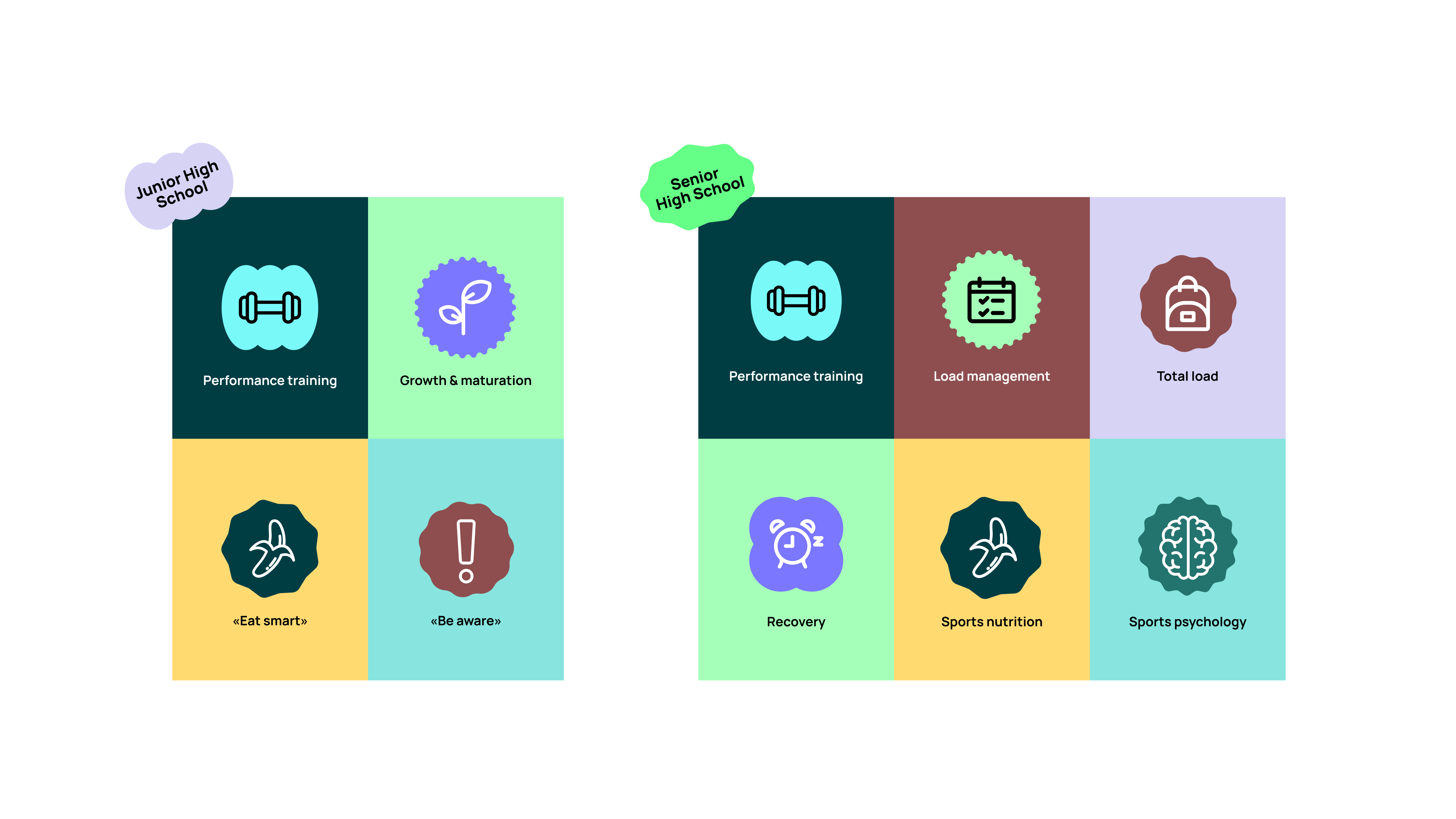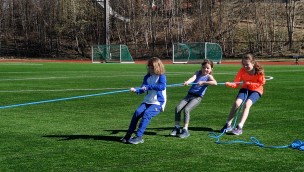Prep to be PRO! – For Young Aspiring Athletes
The combination of physical demands, high ambitions, and a natural physiological growth and maturation process makes students at sports high schools particularly vulnerable to sports injuries and illness. Therefore, the Oslo Sports Trauma Research Center at the Norwegian School of Sport Sciences has developed the educational program Prep to be PRO.

Prep to be PRO is designed to address the complexity of ensuring holistic health in a development and performance environment for youth. It has been developed in collaboration with sports high schools, Healthy Sport, Olympiatoppen (the Norwegian Olympic Training Center), and other experts.
The goal of Prep to be PRO is to help youth feel more secure in making good choices for themselves – by pursuing long-term athletic goals while also managing their everyday lives. The Prep to be PRO program consists of 10 modules, each with a main theme. Four modules are tailored for sports junior high school students, and six for sports academy high school students. The educational program aligns with the latest curricula and relevant competence and learning objectives and can be used across all sports. The teaching in each module is conducted by the schools’ own resources (coaches/teachers/staff).
Below is a summary of each module, providing information and serving as a starting point for valuable conversations and discussions.
Prep to be PRO – Sports Junior High School Modules

SPORTS JUNIOR HIGH SCHOOL: Performance Training
Performance training is about understanding that achieving good results requires a lot of systematic training over time. Building a body that can handle large amounts of training requires patience. A long-term approach to training is essential, as it takes time to develop physical qualities like strength and endurance. Useful tools in this context include the Get Set app and website (FittoPlay.org), which provide tips and guidance on injury prevention and performance-enhancing training. Performance training isn’t just about training hard – it’s about training smart. Training that keeps you injury-free and healthy is the best form of training, as it allows for continuous improvement without setbacks from injuries. Avoiding injuries makes training more rewarding and provides the best foundation for development in your sport.
SPORTS JUNIOR HIGH SCHOOL: Growth and Maturation
Adolescence is a time of significant physical and mental changes. Puberty brings many "reconstructions" as both the body and brain develop. Important changes occur in the skeleton, muscles, tendons, and brain during this phase. Development varies from person to person, and growth doesn’t happen at the same rate for everyone. Within the same age group, there can be up to five years' difference in maturity. Therefore, it is important not to compare yourself too much with others but rather focus on your own development.
SPORTS JUNIOR HIGH SCOOL: Eat smart
This module is based on the "Smart Eating" presentation by Healthy Sport. It covers the food pyramid, illustrating how to build a solid foundation for the body with the right and sufficient food. It focuses on getting adequate nutrition, so the body functions optimally both in training and daily life. Topics include indulgences in the diet, energy drinks, and practical solutions like the "food bag" – containing healthy, simple food that provides the energy and nutrients needed between training sessions and throughout the day.
SPORTS JUNIOR HIGH SCHOOL: Be aware
A good starting point for developing awareness of your own training and growth is to reflect on what you enjoy most about your sport and what aspects of training you like best. This creates motivation and engagement in daily training. A key part of this module is understanding the concept of "critical periods." Youth create their own annual calendars, marking periods when they need to pay extra attention to their body and health – for example, after vacations or injuries, when the body is more vulnerable. Through this module, youth gain insight into why they are more susceptible to illness or injury during certain periods and how to adjust and build their training accordingly. Involving parents and coaches can also provide support and guidance in developing a training routine that considers both physical and mental needs.
Prep to be PRO – Sports Academic High School Modules
SPORTS ACADEMIC HIGH SCHOOL: Performance Training
What does it take to excel in your sport? This module focuses on identifying specific skills and physical attributes that need to be developed and how to optimize training for peak performance. A key part is understanding the relationship between illness, injury, and athletic performance. The module differentiates between acute injuries (occurring suddenly) and overuse injuries (developing over time). Preventing and managing these injuries is essential. Tools like the Get Set app offer valuable resources for injury prevention tailored to specific sports and training needs.
SPORTS ACADEMIC HIGH SCHOOL: Load Management
Training planning introduces key concepts for structuring training to achieve the best progression and results. The module explores managing training loads and increasing intensity in a controlled way. Critical periods are revisited, emphasizing caution after breaks or injuries. The use of training logs and tools like RPE (Rate of Perceived Exertion) helps monitor progress. The focus is on finding the right balance – not too much, not too little – for optimal development.
SPORTS ACADEMIC HIGH SCHOOL: Total Load
Understanding and managing total physical and mental load is crucial during adolescence. This module compares the total load to a backpack carrying everything from training and schoolwork to social obligations. Prioritization and avoiding unnecessary distractions are key to managing stress. Youth learn to identify what gives and drains energy, ensuring regular "recharges" through rest, social interaction, and enjoyable activities.
SPORTS ACADEMIC HIGH SCHOOL: Recovery
Recovery is vital to support training. Adequate rest helps prevent exhaustion, improve performance, and reduce injury risks. This module emphasizes sleep, nutrition, and mental relaxation as cornerstones of effective recovery.
SPORTS ACADEMIC HIGH SCHOOL: Sports Nutrition
This module covers how nutrition influences performance and recovery. The food pyramid and balanced diets are central, with a focus on eating enough and diversely. The role of social influences and media on dietary choices is also discussed, promoting critical thinking around supplements and energy drinks.
SPORTS ACADEMIC HIGH SCHOOL: Sports psychology
Mental health involves managing stress, expectations, and self-comparisons. This module highlights resilience, growth through failure, and the importance of disconnecting from digital pressures. Building support networks and reflecting on experiences aids in personal growth.
... and for their parents!
Parents play a critical role in supporting youth sports participation. By encouraging independence, focusing on enjoyment, and emphasizing effort over results, parents can foster positive experiences. Building strong relationships with other parents, supporting the coaching environment, and demonstrating good sportsmanship are key.
Participation and engagement in sports offer fantastic opportunities for development, socialization, and interaction with peers and adults. It allows young people to build lifelong friendships, gain confidence in social situations, and improve key skills such as empathy, communication, and collaboration.
Sports participation also provides opportunities to develop various intrapersonal qualities (i.e., thoughts and feelings within the individual), fostering a sense of competence, experiencing athletic success, and gaining a better understanding of the value of being physically active. Sports should be fun!
We know that youth thrive best in sports with strong support and guidance from parents. As a sports parent, you can play an active and important role. Below are some suggestions based on recent research, as well as recommendations from Olympiatoppen and the Norwegian Sports Federation, on how to be a good sports parent.
How to Be a Good Sports Parent:
- Provide Information and Advice on Choosing a Sport.
Encourage your child but let them make the final decision on whether and to what extent they want to participate. Help them understand that sports can be a valuable learning arena for personal development. Maintain regular communication with your child about their motivation for participating in sports and what they hope to achieve. This is especially important during key transition periods, such as switching teams, schools, or recovering from an injury, as motivation to participate may shift. This topic is covered in detail in the Closer to Best modules "Performance Training" and "Critical Periods." - Recognize that Youth of the Same Age Can Develop at Different Rates.
Encourage independence and help your child take control of their athletic development without comparing themselves to others. This is emphasized in the Prep to be PRO module on "Growth and Development." - Focus on the Joy of Sports and the Development of Strong Friendships.
Prioritize the process. Highlight the benefits of being involved and engaged in sports beyond winning and losing. Be present at all moments where you can observe and support your child’s athletic experience and development. This is further explored in several Prep to be PRO modules, including "Critical Periods," "Total Load Management," and "Recovery." - Praise Effort and Skill Development.
Youth participate in sports to learn, grow, and master new skills. Avoid focusing solely on competition results, especially during puberty. This concept is explained in greater detail in the Prep to be PRO "Performance Training" module. - Foster Good Relationships with Other Parents.
Be a role model in how you communicate and interact with other youth and adults in the sports environment. Show respect and courtesy, even when emotions run high. Recognize and applaud the skills of teammates and opponents alike. - Collaborate with and Support the Sports Environment Your Child Participates In.
Support the coach(es) and the work they do. Demonstrate good sportsmanship, respect rules, referee decisions, and the organizer’s choices – even if you disagree or have a different perspective.


